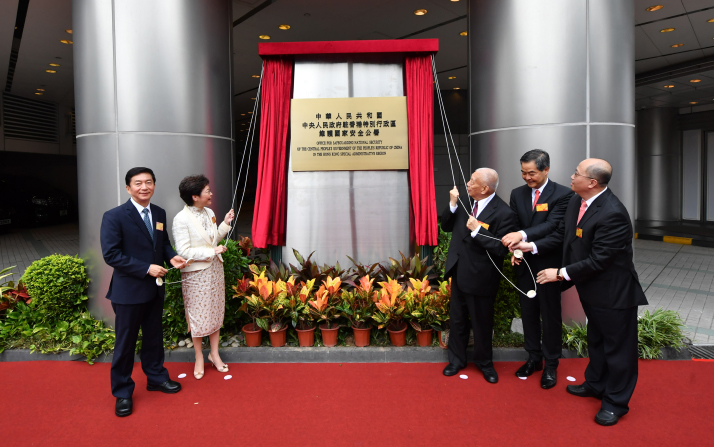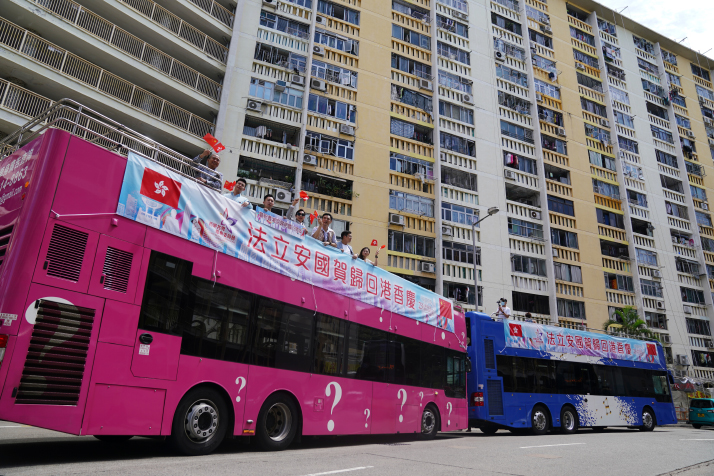| Opinion |
| National security law for Hong Kong safeguards stability while protecting the rights of residents | |
| The adoption of the national security law is the best birthday gift that will help lift Hong Kong out of the turmoil of the past year | |
|
|
 The Office for Safeguarding National Security of the Central People's Government in Hong Kong Special Administrative Region is inaugurated in Hong Kong on July 8 (XINHUA)
The national security law for Hong Kong unanimously passed by the Standing Committee of the National People's Congress (NPC), China's top legislature, has attracted widespread attention. Effective immediately, it is officially known as the Law of the People's Republic of China on Safeguarding National Security in Hong Kong Special Administrative Region (HKSAR). July 1 marked the 23rd anniversary of Hong Kong's return to the motherland, and the adoption of this new law just hours before the anniversary is the best birthday gift that will help lift Hong Kong out of the turmoil of the past year. On the day the law was passed, the "pro-independence" Hong Kong National Front announced that it would disband its branch in Hong Kong. Key members such as Joshua Wang, Nathan Law and Agnes Chow pulled out of another political group advocating "Hong Kong independence," demonstrating that the law is proving an effective deterrent. Extensive support Anti-China forces abroad, working alongside "pro-independence" forces in Hong Kong, have been promoting riots that have seriously jeopardized China's sovereign security. The HKSAR Government has been unable to enact laws on its own to safeguard national security in accordance with Article 23 of the Basic Law of HKSAR because of obstruction by the opposition. As national security is part of its mandate, the Central Government has created systematic and comprehensive regulations for the legal system and enforcement mechanisms for safeguarding national security in HKSAR. These regulations are necessary for the implementation of the "one country, two systems" principle, and to prevent, suppress and impose punishment for the offenses of secession, subversion, organization and perpetration of terrorist activities, and collusion with a foreign country or with external elements to endanger national security in relation to HKSAR. On May 28, the Third Session of the 13th NPC approved the Decision of the NPC on Establishing and Improving the Legal System and Enforcement Mechanisms for Safeguarding National Security in HKSAR, which marked the start of the legislative process. The drafting of the law is based on extensive research, including suggestions put forward by Carrie Lam, Chief Executive of HKSAR, and other major officials from the HKSAR Government. The Hong Kong and Macao Affairs Office of the State Council and the Liaison Office of the Central People's Government in HKSAR listened to national legislators and political advisors from Hong Kong as well as representatives from various sectors in Hong Kong. The draft text went through a number of modifications so that the law best reflects specific local conditions and represents local residents' opinions.  People take part in a parade in Hong Kong to celebrate the 23rd anniversary of Hong Kong's return to the motherland on July 1 (XINHUA)
A targeted law Secession, subversion, organization and perpetration of terrorist activities are the offenses listed in the law, alongside collusion with a foreign country or with external elements to endanger national security. Making these four acts offenses targets a very small number of people, mainly those colluding with external forces to promote riots and violence that have undermined national security and stability since Hong Kong's return. The law is by no means designed to curb Hong Kong residents' freedoms as some have assumed. The law stipulates that human rights shall be respected and protected in safeguarding national security in HKSAR. The rights and freedoms, including the freedoms of speech, of the press, of publication, of association, of assembly, of procession and of demonstration, which the residents of Hong Kong enjoy under the Basic Law and the provisions of the International Covenant on Civil and Political Rights and the International Covenant on Economic, Social and Cultural Rights as applied to Hong Kong, shall be protected. The national security law helps shield Hong Kong from turmoil, maintain its stability and prosperity, and safeguard its democracy, freedom, diversity and openness. The goal is to ensure Hong Kong residents' safety and protect them from being intimidated or assaulted by rioters, and also to ensure the safety of international capital and personnel in Hong Kong. The law is not retroactive. Thus, Hong Kong residents who endangered national security by committing acts now deemed offenses, such as participating in "pro-independence" protests before the law's entry into force, will not be held accountable as long as they cease committing acts against national security. Those who continue to commit such acts after the law entered into force will be punished according to the law, with the severest punishment being life imprisonment. The introduction of the law has been hailed by the vast majority of local residents as a positive step, while only a small number of "independence" supporters feel worried. These different responses are already telling something. High degree of autonomy intact The law stipulates the way in which the legal system and enforcement mechanisms operate at both national and regional levels. There are two major institutions responsible for implementing the laws: the Office for Safeguarding National Security of the Central People's Government in HKSAR, and the Committee for Safeguarding National Security of HKSAR. Some claim this structure will undermine the high degree of autonomy enjoyed by HKSAR. However, the law will not hurt the region's high degree of autonomy as the arrangement is made based on full consideration of the complicated security situation in Hong Kong. As acts against national security since Hong Kong's return reveal, risks are posed not only by those advocating "Hong Kong independence," but also by external forces such as those in the United States. Hong Kong is an SAR of China, the foreign affairs and national defense of which are administered by the Central Government. In the face of external elements, HKSAR may feel incapable of handling these issues. In that case, the Central Government will have to take charge. Therefore, HKSAR and the Central Government have different law-enforcement powers to be used against the various offenses against national security. The law shall apply to offenses committed in HKSAR by any person. An offense shall be deemed to have been committed in HKSAR if an act constituting the offense or the consequence of the offense occurs in the region. It shall also apply to offenses committed on board a vessel or aircraft registered in the region, and to a person who is a permanent resident of HKSAR or an incorporated or unincorporated body such as a company or an organization that is set up in the region if the person or the body commits an offense outside the region. Of these offenses, Hong Kong is able to deal with only some of the cases through its own legal system and enforcement mechanisms. The Office for Safeguarding National Security of the Central People's Government in HKSAR shall, upon approval by the Central Government of a request made by the HKSAR Government or by the office itself, exercise jurisdiction over a case if: (1) the case is complex due to the involvement of a foreign country or external elements, thus making it difficult for the region to exercise jurisdiction; (2) a serious situation occurs when the HKSAR Government is unable to effectively enforce the national security law; or (3) a major and imminent threat to national security has occurred. (Print Edition Title: Law and Order) Copyedited by Garth Wilson Comments to lanxinzhen@bjreview.com |
|
||||||||||||||||||||||||||||||
|
